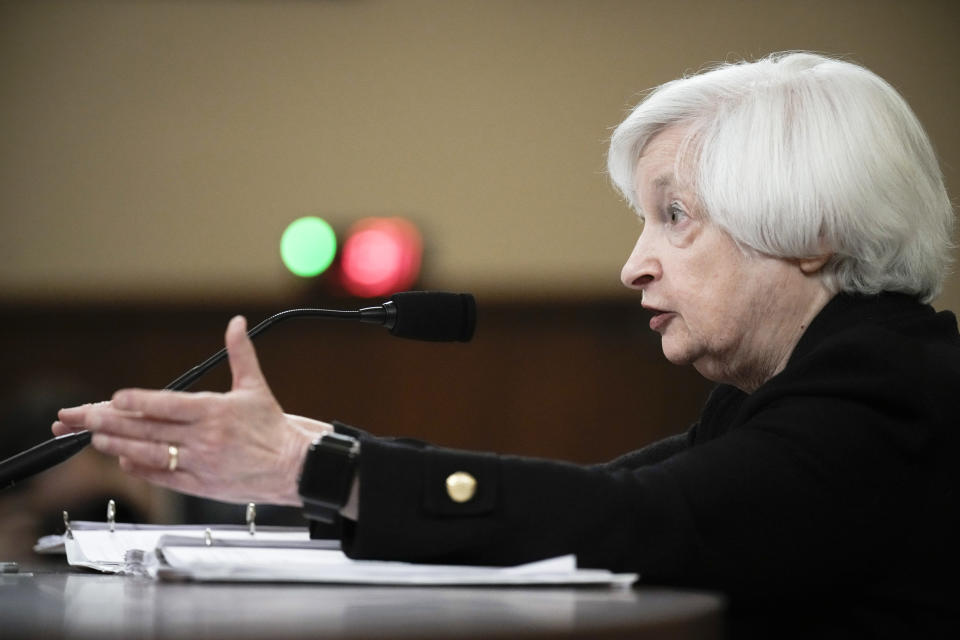Biden officials say 'resilient' banking system can withstand Silicon Valley Bank collapse
- Oops!Something went wrong.Please try again later.
- Oops!Something went wrong.Please try again later.
WASHINGTON — Biden administration officials on Friday argued that safeguards enacted after the 2008 financial crisis would protect the U.S. economy in the wake of Silicon Valley Bank shuttering.
Treasury Secretary Janet Yellen met with banking regulators on Friday to discuss the sudden developments, according to the Treasury Department, and said the federal government was well-equipped to handle the situation.
"Secretary Yellen expressed full confidence in banking regulators to take appropriate actions in response and noted that the banking system remains resilient and regulators have effective tools to address this type of event," the department said in a readout of the meeting.
Yellen met with top officials from the Federal Reserve, the Federal Deposit Insurance Corporation and the Office of the Comptroller of the Currency.
Earlier in the day, before the collapse of Silicon Valley Bank was announced, Yellen told House lawmakers during a budget hearing that "there are recent developments that concern a few banks that I’m monitoring very carefully. And when banks experience financial loss, it is and should be a matter of concern."

During Friday's White House briefing, one of President Joe Biden's top economic advisers contrasted Silicon Valley Bank's closure with the financial crisis of 2008.
“Our banking system is in a fundamentally different place than it was, you know, a decade ago,” Cecilia Rouse, chair of the White House Council of Economic Advisers, told reporters. “The reforms that were put into place back then really provide the kind of resilience that we’d like to see. So we have every faith in our regulators.”
When pressed further about potential economic and financial fallout, Rouse said that the reforms implemented after 2008 involved putting in place stress tests for banks and other tools that regulators can use to protect the banking system.

The California Department of Financial Protection and Innovation on Friday took over and closed Silicon Valley Bank to protect deposits, naming the FDIC as its receiver. The FDIC has formed a separate entity where all of the bank's insured deposits will be available by Monday morning.
The closure is the biggest bank failure since the 2008 financial crisis and the second-largest on record after Washington Mutual collapsed during that industry-wide meltdown, according to FDIC data.
Democratic Rep. Ro Khanna, whose district includes Silicon Valley, said Friday that he had reached out to the White House and the Treasury Department to discuss the bank's failure.
"I emphasized the importance of doing whatever is legally permissible & appropriate to support the Bank which is central to the startup & tech economy," he said on Twitter.
Rep. Eric Swalwell, a fellow California Democrat, tweeted that he's working with his colleagues from the state on protecting all depositors at Silicon Valley Bank, which at the end of December was the nation's 16th largest.
"We must make sure all deposits exceeding the FDIC $250k limit are honored. Banking is about confidence," he said. "If depositors lose confidence on the safety of their deposits over 250k then we are in trouble."
The shutdown came after a tumultuous morning for the bank, during which trading of its shares was halted after they fell by double-digits before markets opened. That downslide came on the heels of a more than 60% decline Thursday.
Worries over a run at SVB led Wall Street investors to dump other bank stocks. Shares of other prominent West Coast lenders took sharp nosedives Friday, including First Republic Bank, PacWest Bancorp and Western Alliance Bancorporation.
This article was originally published on NBCNews.com

